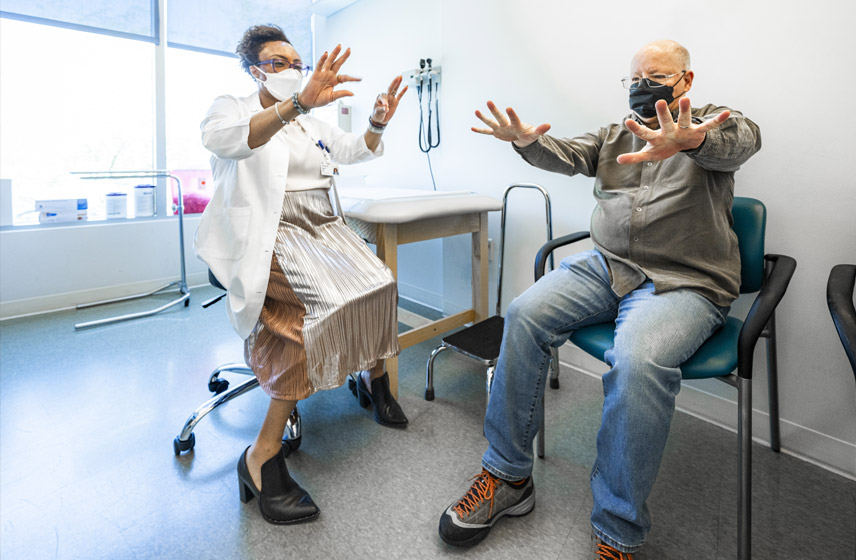10 Signs It’s Time to See a Parkinson’s Specialist — Don’t Ignore These Early Clues
Parkinson’s disease is a progressive neurological disorder that can impact movement, coordination, speech, and even mood. Catching the signs early and connecting with a Parkinson’s specialist can make a world of difference in managing the condition effectively. But many people either miss or dismiss the early symptoms, mistaking them for aging or stress. In this post, we’ll uncover 10 important signs that indicate it’s time to seek out a Parkinson’s specialist, how these experts can help, and what you can expect during a consultation.
Why Early Diagnosis Matters
Parkinson’s disease develops gradually, and early signs are often subtle. Many people delay getting help until symptoms significantly interfere with daily life. However, the earlier you consult a Parkinson’s specialist, the sooner you can start managing symptoms, slow progression, and improve long-term quality of life.
A Parkinson’s specialist—often a neurologist with additional training in movement disorders—can identify early-stage Parkinson’s more accurately than a general practitioner. This expert insight leads to tailored treatments and better outcomes.
1. Persistent Tremors or Shaking
One of the most well-known signs of Parkinson’s disease is a resting tremor, often starting in the fingers or hand. If you or a loved one notice recurring tremors even when the body is at rest, it’s time to see a Parkinson’s specialist.
Unlike occasional muscle twitches or spasms, Parkinson’s tremors are rhythmic and worsen with time.
2. Stiffness or Muscle Rigidity
Another early warning sign is stiffness in the arms, legs, or neck. This rigidity may cause pain or limit your range of motion. If stiffness doesn’t go away with movement or exercise, a Parkinson’s specialist can assess whether it’s linked to early-stage Parkinson’s disease.
3. Slowed Movements (Bradykinesia)
People with Parkinson’s often experience bradykinesia, a noticeable slowness in movement. Everyday tasks like buttoning a shirt or walking across a room may take longer. This slowing can make basic activities frustrating, and it’s a clear reason to consult a Parkinson’s specialist.
4. Changes in Handwriting
Micrographia, or small, cramped handwriting, is a lesser-known symptom of Parkinson’s. If your handwriting has suddenly become smaller and harder to read, and you’re having trouble controlling the pen, it could be a neurological issue. A Parkinson’s specialist can determine if this change is linked to motor control problems.
5. Facial Masking (Loss of Facial Expression)
Parkinson’s disease can cause facial muscles to become less responsive, resulting in a “masked” expression. This may look like reduced blinking, a blank stare, or difficulty showing emotions through facial movements.
If others comment that you “always look serious” or your face appears expressionless, it’s worth discussing this with a Parkinson’s specialist.
6. Soft or Slurred Speech
Speech changes often occur early in Parkinson’s. You may notice your voice becoming softer, hoarser, or monotone. Some people slur their words or pause more frequently during conversations. These changes can indicate a disruption in motor control that warrants evaluation by a Parkinson’s specialist.
7. Shuffling Walk or Balance Issues
Parkinson’s can affect gait, posture, and balance. If you’re shuffling your feet, taking smaller steps, or leaning forward while walking, these may be red flags. A Parkinson’s specialist can evaluate your coordination and test for subtle movement impairments.
8. Sleep Disruptions
Sleep disturbances such as vivid dreams, acting out dreams (REM sleep behavior disorder), or sudden movements during sleep are often linked to Parkinson’s. Many patients report feeling exhausted even after a full night’s rest. If sleep issues are persistent, a Parkinson’s specialist may investigate their neurological origins.
9. Loss of Smell (Anosmia)
Although it may sound surprising, a reduced or lost sense of smell can be an early sign of Parkinson’s. If you’ve noticed a diminished ability to detect odors for several months and there’s no cold or sinus infection to blame, a Parkinson’s specialist might consider this as part of a larger pattern of symptoms.
10. Mood Changes or Depression
Parkinson’s doesn’t just affect the body—it also impacts mood and mental health. Many people experience depression, anxiety, or apathy before the more visible physical symptoms appear. If these feelings are new or unexplained, a Parkinson’s specialist can help uncover the underlying neurological cause.
What Happens When You Visit a Parkinson’s Specialist?
Your first visit with a Parkinson’s specialist will involve a detailed review of your symptoms, medical history, and a physical and neurological exam. They may evaluate:
- Muscle tone and strength
- Coordination and balance
- Gait and posture
- Facial expressions and speech
- Reflexes and cognitive function
In some cases, brain imaging or other diagnostic tests may be used to rule out other conditions. A Parkinson’s specialist uses clinical expertise and pattern recognition, rather than one definitive test, to diagnose the condition.
How a Parkinson’s Specialist Helps Manage the Disease
Once a diagnosis is confirmed, your Parkinson’s specialist will work with you to develop a customized treatment plan. This could include:
- Medications like Levodopa or dopamine agonists
- Physical therapy for mobility and strength
- Occupational therapy to assist with daily activities
- Speech therapy to improve communication
- Lifestyle changes, diet, and exercise plans
- Mental health support for managing depression or anxiety
Why See a Specialist Instead of a General Neurologist?
While general neurologists are trained to recognize neurological conditions, a Parkinson’s specialist (also called a movement disorder specialist) has extensive training specifically in Parkinson’s disease and other movement-related conditions. This makes them better equipped to:
- Identify subtle symptoms early
- Adjust medications precisely
- Recommend advanced treatment options like Deep Brain Stimulation
- Monitor disease progression closely
- Provide comprehensive, multidisciplinary care
When to Take Action
If you’re noticing one or more of the signs listed above—or a combination—it’s important not to wait. Parkinson’s can often be managed successfully when caught early, and a Parkinson’s specialist can offer the best support for slowing its progression.
Remember, you don’t need to have all the classic symptoms to warrant a visit. Even subtle or unusual changes are worth exploring with a qualified expert.
FAQs About Parkinson’s Specialists
What kind of doctor is a Parkinson’s specialist?
A Parkinson’s specialist is usually a neurologist who has undergone additional training in movement disorders. They focus on diagnosing and managing Parkinson’s disease and similar conditions.
Do I need a referral to see a Parkinson’s specialist?
This depends on your healthcare provider or insurance plan. In many cases, you can request a referral from your primary care physician or directly book an appointment.
What should I bring to my first appointment?
It’s helpful to bring:
- A list of symptoms
- Medications you’re currently taking
- Family medical history
- Notes about when symptoms started and how they’ve progressed
Can a Parkinson’s specialist help with non-motor symptoms?
Yes. A Parkinson’s specialist can help manage both motor symptoms (tremors, stiffness) and non-motor symptoms (sleep problems, mood changes, fatigue).
Is there a cure for Parkinson’s disease?
There is currently no cure, but a Parkinson’s specialist can offer treatments that manage symptoms effectively and improve your quality of life.
Final Thoughts
Don’t ignore the warning signs. What may seem like small quirks in your movement, voice, or mood could be the early whispers of Parkinson’s disease. Connecting with a Parkinson’s specialist at the first sign of trouble allows for faster diagnosis, better treatment, and a stronger game plan for the future.
If you’re noticing any combination of these symptoms—tremors, stiffness, slowed movements, or changes in behavior—it’s time to prioritize your neurological health. A Parkinson’s specialist can be your partner in navigating the journey ahead.












